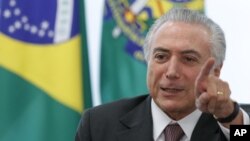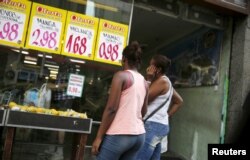Donald Trump's U.S. election victory and the ensuing market volatility should encourage Brazilian policymakers to push ahead with ambitious economic reforms that help cushion the country from global turmoil, business executives and bankers said Tuesday.
A lack of decisive action to nudge Congress into approving broad pension, labor and spending cap legislation over the next months could imperil President Michel Temer's effort to pull Brazil out of its deepest recession in eight decades, executives told Reuters at a New York event sponsored by Banco Bradesco SA.
One of them, who declined to be identified because of the sensitivity of the issue, said Trump's surprise victory has shown that "more than ever, the fate of Brazil depends on Brazil, which means it is up to us to fix our economy and lure capital."
Markets rattled
Trump's victory has sent shock waves through emerging markets, with currencies from Mexico to Brazil losing more than a tenth of their value and the price of local bonds plummeting.
The Temer administration has been cautious in reacting to the election, but officials have acknowledged that the country's incipient recovery could suffer if Trump makes good on his promises to limit trade.
Growing expectation that Trump's stimulus plans could force the U.S. Federal Reserve to raise rates more than expected has also sparked a flight of capital away from Brazil and other emerging markets and into U.S. Treasuries.
A senior banker and the chief executive officer of a Brazilian consumer goods producer agreed that government and congressional inaction on the reform agenda could deter the central bank from cutting interest rates. Brazil's benchmark overnight lending rate, at 14 percent, is among the world's highest.
The high rates have long inhibited capital spending, aggravating Brazil's chronic lack of infrastructure and the emergence of long-term financing for businesses. The banker added that approval of the reforms could help bring back investors who remain wary of the country's explosive debt trends despite the government promises to rein in expenditures.
Policy dilemmas
Their remarks underscore the policy dilemmas facing several countries around the world in the wake of Trump's November 8 victory.
The Brazilian central bank has stepped up intervention in its foreign currency market, and the country's Treasury has halted the sale of some local bonds in response to the volatility.
Officials have said they expect the volatility to be short-lived, but the real's slump since the election has hindered hopes for more aggressive rates cuts in Latin America's biggest economy.
Some large investors said the Temer administration understands the need to get Brazil's reform package passed, but they played down the effect of the U.S. election.
"In principle, Trump's victory is not an incentive for Brazil to advance on the policy front, but if policymakers act on top of it, then great," said Will Landers, who oversees $2 billion in Latin American equities for Blackrock Inc. "They know their task, and we are very confident of their ability to deliver."
Blackrock, the world's largest money manager, has an "overweight" position in Brazilian equities that is the biggest in at least three years, Landers added.






